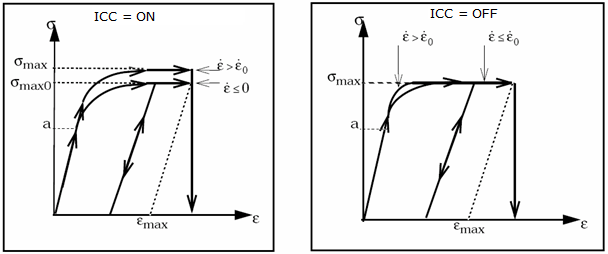MATX02 |

|

|

|

|
|
MATX02 |

|

|

|

|
Bulk Data Entry
MATX02 – Material Property Extension for Johnson-Cooke Elastic-plastic Material for Geometric Nonlinear Analysis
Description
Defines additional material properties for Johnson-Cooke elastic-plastic material for geometric nonlinear analysis. This is an elasto-plastic law with strain rate and temperature effects.
Format
(1) |
(2) |
(3) |
(4) |
(5) |
(6) |
(7) |
(8) |
(9) |
(10) |
MATX02 |
MID |
A |
B |
N |
EPSMAX |
SIGMAX |
C |
DEPS0 |
|
|
ICC |
FSMOOTH |
FCUT |
M |
TMELT |
RCP |
|
|
|
|
Field |
Contents |
MID |
Material ID of the associated MAT1. See comment 1. No default (Integer > 0) |
A |
Plasticity yield stress. (Real > 0) |
B |
Plasticity hardening parameter. (Real > 0) |
N |
Plasticity hardening exponent. Default = 1.0 (Real < 1.0) |
EPSMAX |
Failure plastic strain εmax Default = 1030 (Real > 0) |
SIGMAX |
Maximum plastic stress σmax0 Default = 1030 (Real > 0) |
C |
Strain rate coefficient. If zero, there is no strain rate effect. Default = 0.0 (Real) |
DEPS0 |
Reference strain rate Default = 0.0 (Real) If DESPS < DESPS0, no strain rate effect. |
ICC |
Strain rate dependency of σmax flag. See comment 5. Default = ON (ON or OFF) |
FSMOOTH |
Strain rate smoothing flag. Default = OFF (ON or OFF) |
FCUT |
Cutoff frequency for strain rate filtering. Only for shell and solid elements. Default = 1030 (Real > 0) |
M |
Temperature exponent. Default = 0.0 (Real) |
TMELT |
Melting temperature. Default = 1030 (Real > 0) |
RCP |
Specific heat per unit of volume. Default = 0.0 (Real > 0) |
| 1. | The material identification number must be that of an existing MAT1 bulk data entry. Only one MATXi material extension can be associated with a particular MAT1. |
| 2. | MATX02 is only applied in geometric nonlinear analysis subcases which are defined by ANALYSIS = EXPDYN. It is ignored for all other subcases. |
| 3. | This is an elastic-plastic law with strain rate and thermal effects. It follows: |

Where,

Where, ![]() is the plastic strain,
is the plastic strain, ![]() is the strain rate, and T is the temperature (in Kelvin).
is the strain rate, and T is the temperature (in Kelvin).
| 4. | If the plastic strain reaches EPSMAX, shell elements are deleted. Solid elements are not deleted, but the deviatoric stress is set to zero. |
| 5. | ICC controls the strain rate effect. |


| 6. | No strain rate effects are considered in rod elements. |
| 7. | Strain rate filtering is used to smooth strain rates. The input FCUT is available only for shell and solid elements. |
| 8. | To take into account the temperature effect, strain rate dependence must be activated. If the temperature exponent M = 0; there is no temperature effect. No temperature effect is considered on rod, bar, and beam elements. |
| 9. | The temperature is computed assuming adiabatic conditions: |

where, Eint is the internal energy.
If ρCp = 0, the temperature is constant: T = Ti
| 10. | This card is represented as an extension to a MAT1 material in HyperMesh. |
See Also: